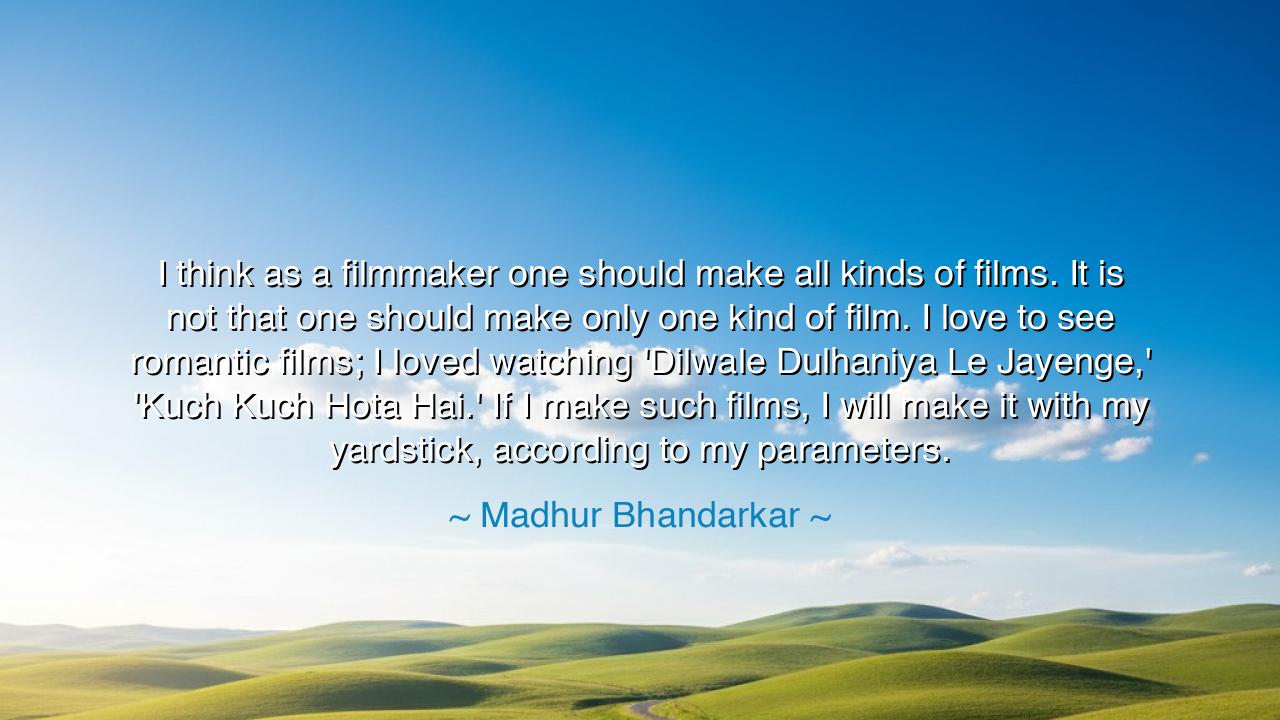
I think as a filmmaker one should make all kinds of films. It is
I think as a filmmaker one should make all kinds of films. It is not that one should make only one kind of film. I love to see romantic films; I loved watching 'Dilwale Dulhaniya Le Jayenge,' 'Kuch Kuch Hota Hai.' If I make such films, I will make it with my yardstick, according to my parameters.






In the words of Madhur Bhandarkar, master of cinema’s many shades, we hear a timeless teaching: “I think as a filmmaker one should make all kinds of films. It is not that one should make only one kind of film. I love to see romantic films; I loved watching ‘Dilwale Dulhaniya Le Jayenge,’ ‘Kuch Kuch Hota Hai.’ If I make such films, I will make it with my yardstick, according to my parameters.” Though spoken of cinema, this truth belongs to all of life—for it is the wisdom of diversity, the courage of experimentation, and the call to create according to one’s own measure.
The ancients, though they knew not the glowing screen, knew the power of stories in many forms. Homer sang of war and wrath in the Iliad, but also of longing and homecoming in the Odyssey. Sophocles gave us tragedy, Aristophanes laughter. They did not chain themselves to one kind of tale, for they knew that the soul has many faces, and each must be reflected if humanity is to see itself whole. So too does Bhandarkar remind us that a true filmmaker is not bound to one road, but roams across genres as a traveler roams across lands.
When he names the great romantic films of India—Dilwale Dulhaniya Le Jayenge and Kuch Kuch Hota Hai—he speaks not only of cinema, but of the dreams of a nation. These films, filled with love, joy, and longing, captured the spirit of millions. Yet Bhandarkar, known for his hard-hitting realistic dramas, does not dismiss them. Instead, he honors them, and declares that if he were to make such stories, he would do so by his own yardstick, according to his own parameters. This is the mark of a true artist: not to imitate blindly, but to create authentically, even within a tradition beloved by many.
Consider Leonardo da Vinci, the genius of the Renaissance. He did not paint only the sacred Madonna, nor did he restrict himself to the mysterious smile of the Mona Lisa. He designed machines of war, sketched studies of flight, dissected the human form, and envisioned cities of the future. His greatness lay in his refusal to confine himself. Like Bhandarkar, he lived by the principle that creation must embrace all forms, and that every form must be touched with the seal of one’s own vision.
From this we learn that life itself is a canvas of many genres. To live only in one mode—always serious, always romantic, always tragic—is to deny the fullness of existence. Just as the cinema offers comedy, drama, romance, and realism, so too does life offer laughter, struggle, tenderness, and harsh truth. The wise embrace them all, without shame, and add their own yardstick, their own parameters, to shape meaning from each experience.
The lesson, then, is clear: do not fear variety, nor believe that greatness lies in repeating one kind of achievement. Whether you are a creator of art, a worker in craft, or a seeker of wisdom, allow yourself to move through many realms. Learn from the bright joy of romantic films, from the deep mirror of tragedy, from the playful spirit of comedy, and from the piercing clarity of realism. Each will leave you richer, each will make your voice broader, your soul deeper.
Therefore, O listener, walk the path of the filmmaker not only upon the screen, but in your own life. Experiment. Embrace many forms. And whatever you do, measure it not by another’s hand, but by your own yardstick, according to your own parameters. For only then will your creation—be it art, love, or life itself—bear the seal of authenticity, and only then will it echo through time with the strength of your true self.
For in the end, the teaching of Bhandarkar resounds: greatness is not in choosing one road and never leaving it, but in walking many paths with the courage of originality. Create in many forms, but always create as yourself.






AAdministratorAdministrator
Welcome, honored guests. Please leave a comment, we will respond soon